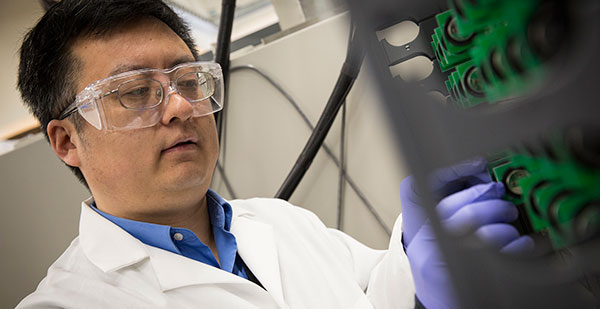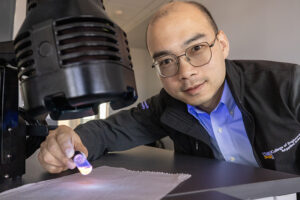
Next generation lithium-ion batteries (NGLIBs) will allow electric vehicles the capacity to drive much farther on a single charge. And new materials, including nanomaterials, have already produced the necessary performance at the lab scale, says Chris Yingchun Yuan, an engineer at the University of Wisconsin-Milwaukee (UWM).
Yuan’s research in NGLIBs inspired him to conduct the first study of the environmental impacts of NGLIB technology – a project that has resulted in an Early CAREER grant from the National Science Foundation.
Yuan, an assistant professor of mechanical engineering, will use the $400,000 on a five-year project to develop mathematical models and computational tools that will lead to greener and more environmentally benign NGLIBs.
“Making these batteries requires the use of more chemicals than the current technology, in addition to creation of the nanomaterials themselves,” says Yuan.
The manufacturing process raises questions about how best to dispose of waste and control environmental emissions, especially since exposure to nanowastes and nanoparticle emissions may pose risks for both occupational and public health.
“With this project, we’re investigating the environmental sustainability of NGLIBs,” he says. “We assume the technology will eventually move into the commercial arena, and we want to be prepared for these questions while the research is still going on.”
CAREER awards are the NSF’s most prestigious grants for younger researchers. They support the career development of teacher-scholars who are most likely to become the academic leaders of this century. Last year, four UWM faculty members were awarded CAREER grants: Phillip Chang (physics), Dawn Erb (physics), Ying Li (engineering) and Arash Mafi (engineering).
Working with three industrial participants – General Motors, Johnson Controls and PE International – Yuan will model the manufacturing process step by step, quantifying the emissions and identifying the factors that affect waste and emissions. The aim is to develop a sustainability assessment tool for use in large-scale production.
Another goal of the project is developing a thermodynamic energy consumption model that also will help reduce energy-related greenhouse gases – and bring down costs.
Lastly, the project will investigate what to do with NGLIBs when they reach the end of their 10-year life spans. Yuan’s research will explore disposal and recycling of the batteries, which will include techniques for removing nanomaterials without releasing them into the environment.
Yuan already is collaborating with Johnson Controls and General Motors on separate research projects centered on NGLIB technology development and green manufacturing of vehicles.
He joined the UWM faculty in 2009, after earning his Ph.D. in mechanical engineering from the University of California, Berkeley, and a master’s degree in industrial engineering from Texas Tech University.
Students will be involved in the research itself and also have access to an informational website. The funding supports one postdoctoral researcher, one graduate student and two undergraduates. Yuan also will offer lectures and short courses for professional development at the three participating industries.






